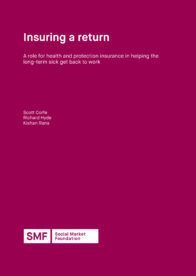The most comprehensive assessment of workplace absence costs from government suggested that, in 2015, the economic costs of sickness absence and worklessness could be as large as £130 billion a year, and the associated costs to the Exchequer as large as £55 billion a year. Tackling this should be a key area of interest to policymakers.
This research, sponsored by the ABI, examines the role played by products such as income protection and private medical insurance in:
- Reducing absence rates
- Facilitating swifter return to work following illness or injury
- Reducing rates of presenteeism
- Generating fiscal benefits to government through reduced welfare spending, healthcare savings and higher tax revenues through supporting return to work
This report primarily concerns itself with providing more data and insights on the linkages between insurance and workplace health outcomes, rather the setting out specific policy options for government. It draws on a wide range of evidence – existing studies, new online surveys of employers and employees, in-depth interviews with businesses and insurance industry data. The SMF commissioned two online surveys from Opinium – a survey of HR decision makers in businesses, and a separate survey of individuals that had suffered a long-term absence of more than four weeks. In addition, the SMF undertook 35 in-depth over-the-phone interviews with businesses.


